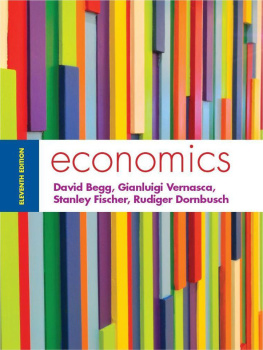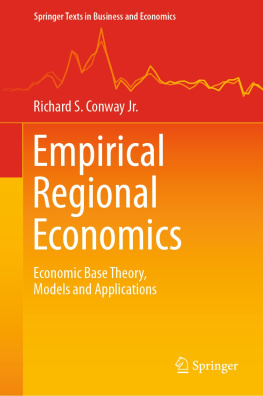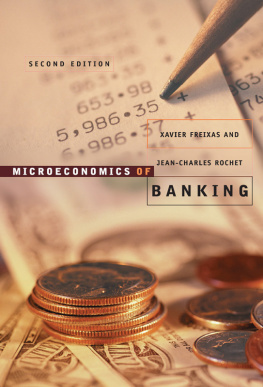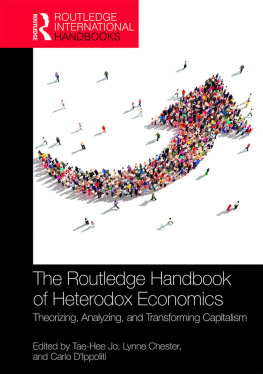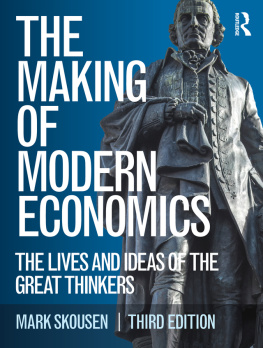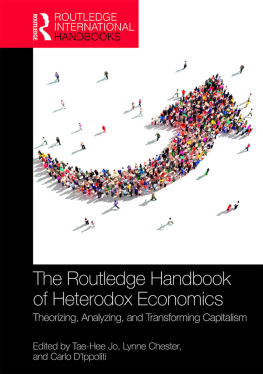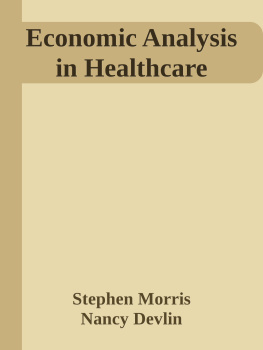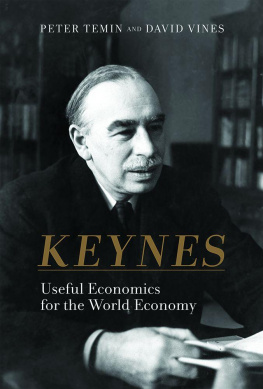ELEVENTH EDITION
economics
David Begg, Gianluigi Vernasca, Stanley Fischer, Rudiger Dornbusch

London Boston Burr Ridge, IL Dubuque, IA Madison, WI New York San Francisco St. Louis Bangkok Bogot Caracas Kuala Lumpur Lisbon Madrid Mexico City Milan Montreal New Delhi Santiago Seoul Singapore Sydney Taipei Toronto
Economics 11th Edition
David Begg, Gianluigi Vernasca, Stanley Fischer and Rudiger Dornbusch
ISBN-13 9780077154516
ISBN-10 0077154517

Published by McGraw-Hill Education
Shoppenhangers Road
Maidenhead
Berkshire
SL6 2QL
Telephone: 44 (0) 1628 502 500
Fax: 44 (0) 1628 770 224
Website: www.mcgraw-hill.co.uk
British Library Cataloguing in Publication Data
A catalogue record for this book is available from the British Library
Library of Congress Cataloging in Publication Data
The Library of Congress data for this book has been applied for from the Library of Congress
Executive Editor: Natalie Jacobs
Commissioning Editor: Kiera Jamison
Development Editor: Alexander Krause
Head of Marketing: Vanessa Boddington
Marketing Manager: Geeta Kumar
Head of Production: Beverley Shields
Text design by Hard Lines
Cover design by Adam Renvoize
Printed and bound in Singapore by Markono
Published by McGraw-Hill Education (UK) Limited an imprint of McGraw-Hill Education, 2 Penn Plaza New York, NY 10121. Copyright 2014 by McGraw-Hill Education (UK) Limited. All rights reserved. No part of this publication may be reproduced or distributed in any form or by any means, or stored in a database or retrieval system, without the prior written consent of McGraw-Hill Education (UK) including, but not limited to, in any network or other electronic storage or transmission, or broadcast for distance learning.
Fictitious names of companies, products, people, characters and/or data that may be used herein (in case studies or examples) are not intended to represent any real individual, company, product or event.
ISBN-13 9780077154516
ISBN-10 0077154517
2014. Exclusive rights by McGraw-Hill Education for manufacture and export. This book cannot be re-exported from the country to which it is sold by McGraw-Hill Education.
Dedication
For Honora, Mary and Robin DB
To my family and to my beloved Vitalba GV
Brief table of contents
Detailed table of contents
Preface
Economics is much too interesting to be left to professional economists. It affects almost everything we do, not merely at work or at the shops but also in the home and the voting booth. It influences how well we look after our planet, the future we leave for our children, the extent to which we can care for the poor and the disadvantaged, and the resources we have for enjoying ourselves.
These issues are discussed daily, in bars and on buses as well as in cabinet meetings and boardrooms. The formal study of economics is exciting because it introduces a toolkit that allows a better understanding of the problems we face. Everyone knows a smoky engine is a bad sign, but sometimes only a trained mechanic can give the right advice on how to fix it.
This book is designed to teach you the toolkit and give you practice in using it. Nobody carries an enormous toolbox very far. Useful toolkits are small enough to be portable but contain enough proven tools to deal with both routine problems and unforeseen circumstances. With practice, you will be surprised at how much light this analysis can shed on daily living. This book is designed to make economics seem as useful as it really is.
How much do economists disagree?
People often complain that economists never agree about anything. This is simply not true. The media, taxi-drivers and politicians love to talk about topics on which there is disagreement; it would be boring TV if all participants in a panel discussion held identical views. But economics is not a subject on which there is always an argument for everything. There are answers to many questions.
We aim to show where economists agree on what and for what reason and why they sometimes disagree.
Economics in the twenty-first century
Our aim is to allow students to understand todays economic environment. This requires mastering the theory and practising its application. Just as the theory of genetics or of information technology is slowly progressing, so the theory of economics continues to make progress, sometimes in dramatic and exciting ways. Sometimes this is prompted by theoretical reasoning; sometimes it is a response to a dramatic new event, such as the banking crash and subsequent financial meltdown around the world.
We believe in introducing students immediately to the latest ideas in economics. If these can be conveyed simply, why force students to use older approaches that work less well? Two recent developments in economics underlie much of what we do. One is the role of information, the other is globalization.
How information is transmitted and manipulated is central to many issues concerning incentives and competition, including the recent boom in e-commerce. Ease of information, coupled with lower transport costs, also explains trends towards globalization, and associated reductions in national sovereignty, especially in smaller countries. Modern economics helps us make sense of our changing world, think about where it may go next, and evaluate choices that we currently face.
Changes to the eleventh edition
After 30 years at the top, we wanted to ensure that the book remains as relevant for the next 30 years as it has been in the past. Those familiar with previous editions will continue to recognize the underlying structure and approach, a window on the latest thinking about our evolving world and the way in which economics can make sense of it.
The eleventh edition has again been thoroughly revised, using feedback from a broad range of actual and potential adopters. A lot has changed in the last three years and it is all reflected in the text. Specific changes to the new edition include:
- A more detailed introduction to economic analysis has been added to .
- A revision of the analysis of consumer choice and demand decisions.
- A more detailed analysis of cost minimization.
- An extended analysis of individuals labour supply and wage discrimination.
- A comprehensive analysis of the financial crash its causes, consequences and possible policy responses, from fiscal stimulus to quantitative easing.
- Full updates throughout to include 2012/13 data in graphs and tables.
- Over 160 contemporary case studies, activities, concepts etc., over 80 of which are new, and which illustrate key ideas with relevance to the real world.
- Important new pedagogical features, including topical new case studies, boxes on economic concepts and activity applications, and optional maths boxes for the technically-minded.
- More electronic resources for both students and lecturers.
With all this change, the books structure is a bit different from the last edition. The main changes are listed below:
- In response to user feedback, the previous (business cycles) and 28 (supply-side and long-run growth).
- This edition also contains a discussion of competing schools of macroeconomic thought, allowing students to enrich their perspective on alternative approaches to macroeconomics. takes stock of how different schools of thought interpret output fluctuations and deviations from potential output.
- contains an expanded discussion of the role of supply-side economics.

